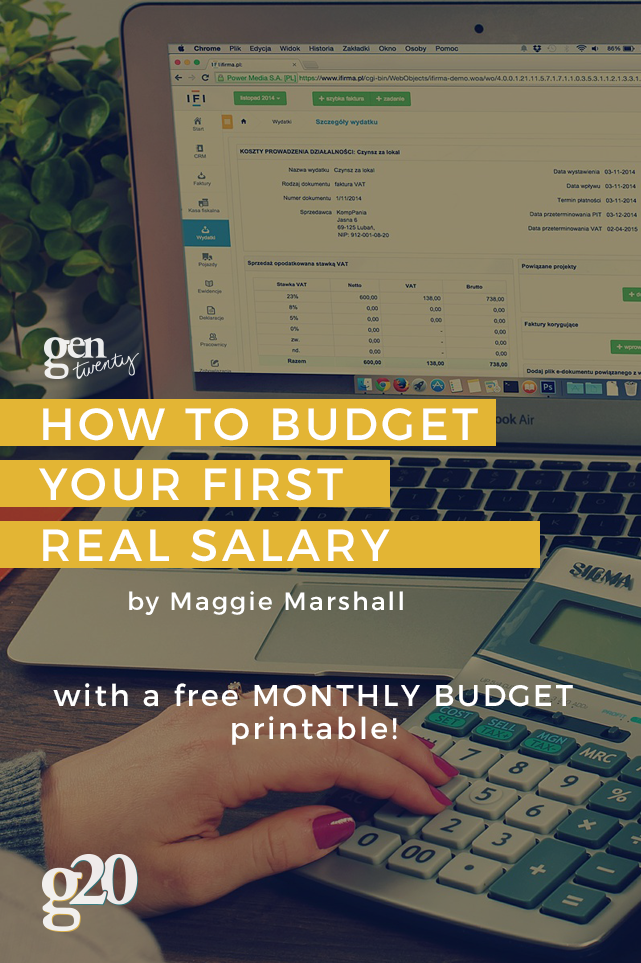
For many of us, there comes a time in life when you put on your professional attire and accept a salaried job. And now it’s time to learn how to budget your first real salary.
It’s exciting, the idea there may be something consistent in your life. You don’t have to go through the month wondering if you’ve worked enough hours to cover your rent. Saving becomes easier to plan (though not necessarily execute — hey, we’re working on it).
So how are you supposed to navigate this new financial world?
How can you make sure not to take advantage of the comfort and peace of mind a salary provides?
Here are some ideas and practices I’ve found helpful when budgeting my first salary:
1. Budget for less.
When I’m planning out my budget for the month, I take the actual amount I will receive and round down… pretty significantly, actually. If I had a monthly paycheck of $1,500 for example, I would budget for about $1,200. I’ve found that pretending my my pay is less than it is causes me to “accidentally” save those couple hundred dollars I pretended didn’t exist.
2. Keep it simple.
The internet is great. However, with spreadsheets, budgeting websites, and financial apps galore, it’s easy to get overwhelmed by (and lose track of) how many options there are.
Though I do use some of these world wide web options (which I’ll talk about later), I also keep a financial binder. In it, I put monthly and yearly budget sheets, as well as bank statements. Grab the Monthly Budget printable from our Resource Library to keep track of your monthly income and expenses to keep in your own financial binder.
3. Keep it updated.
I have an English degree, which means math is not my forte. If I had to add up all my transactions, factor in taxes, interest rates, and all the other financial mumbo jumbo necessary for keeping up with my money, I would never have an accurate idea of how much I’m spending and saving.
This is why, in addition to paper, I also use my bank iPhone apps and an app/website called Mint. You’ve likely heard of it, but with it’s free-ness, good design and free credit score reports, it’s impossible to say Mint isn’t a good deal. Google Docs also provides a monthly and yearly budget spreadsheet, which does the math for you as well, if that’s more your thing.
4. Check daily.
I make sure to look at all my checking, savings, and credit accounts to see how much I have left to spend each month. If you are constantly aware of your balances, it becomes much easier to tell yourself “no” when you see a cute shirt at J. Crew.
There’s a reason financial advisors suggest using cash only – it’s because you can see the money literally leaving your hands. If you’re like me and hate carrying bills around, checking your balance daily does the same thing. I am always aware of how much I have left so that cute top is just a little less tempting when I know how much money I’d be left with afterward.
Your bank may even allow you to set up alerts which will let you know when your balance gets below a certain amount or if you’re close to going over budget.
5. Forgive yourself.
If you’re anything like me, you’re a big fan of retail therapy. If I’m upset or feeling down and guilty, I like to go buy myself something (which may or may not include alcohol…). This isn’t a healthy habit to begin with, but when you’re feeling down about how much money you’ve spent this month, it’s definitely not the way to soothe your guilt.
An easy way to avoid the guilt that leads to money-spending is to not let yourself feel guilty in the first place. Set aside some money from each paycheck for you to spend on yourself — guilt free. Trust us,
Saving money and budgeting is hard. There are so many pretty and supposedly necessary things out there… sometimes it feels impossible to pass up that 40% off sale at Gap. So when you do cave, make sure you don’t go too hard on yourself. Learn from the experience, suffer the financial consequences, and do better next month.
[Tweet “How To Budget Your First Real Salary”]
Other popular finance posts you might like:
- How To Stop Being Afraid of Your Student Loan Debt (Plus Downloadable Debt Tracker)
- 5 Financial Tips for College Student
- Brokenomics: The Money Mindset Twenty-Somethings Need
- How To Be Debt-Free By Your Mid-Twenties
